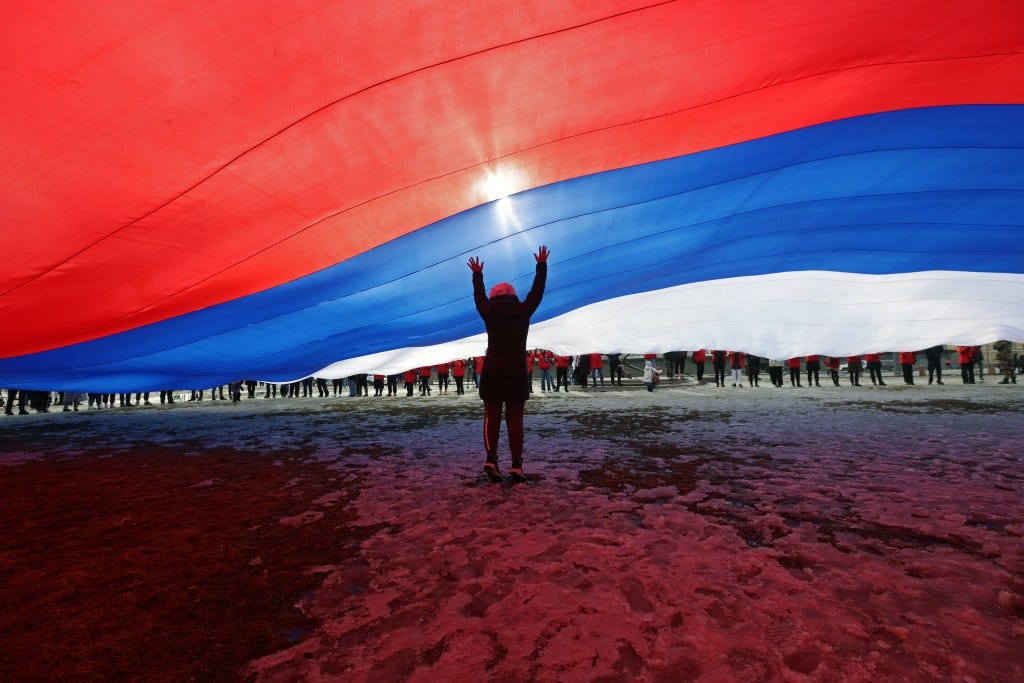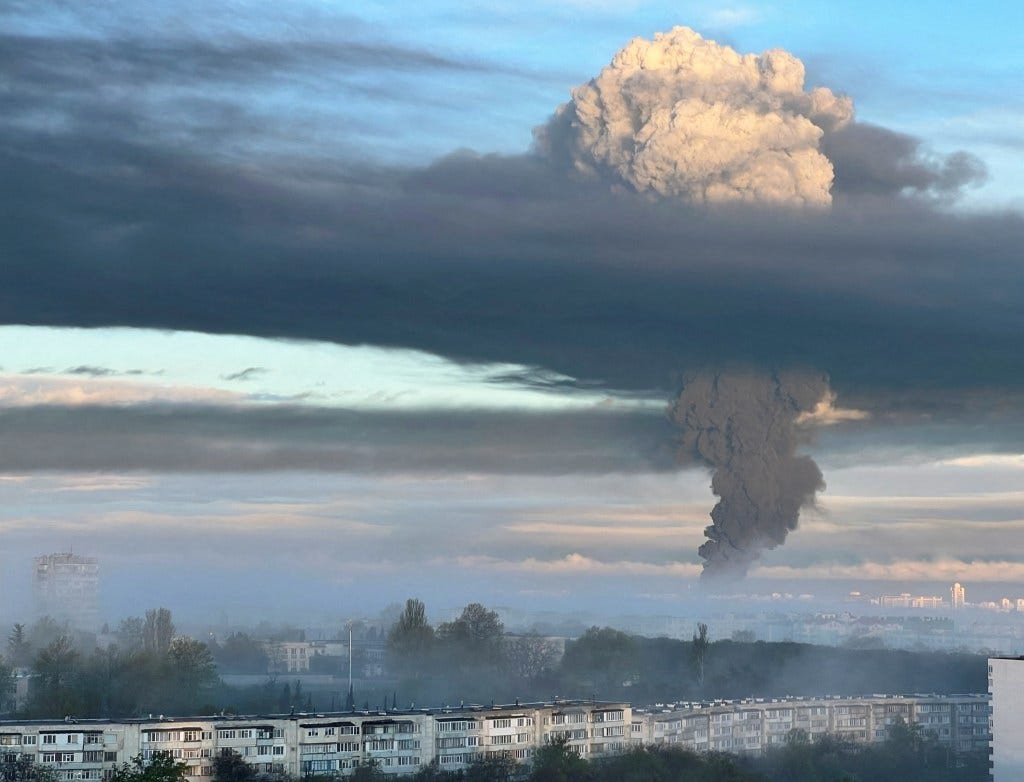Jul 6: Elina Beketova, Behind the Lines: Crimea’s Collaboration Conundrum
As published by CEPA on 29 June 2023
Behind the Lines: Crimea’s Collaboration Conundrum
By Elina Beketova, CEPA, 29 June 2023
Distinguishing between collaborators and victims in Russian occupied Crimea is a live question in Ukraine, and there are few easy answers
When Crimea was annexed by Russia in 2014, one of my friends, a journalist and editor, had to flee the peninsula because she couldn’t stay at the newspaper where she worked. The occupiers would have required her to write propaganda, and couldn’t stomach it. She left her parents and started a new life in Kyiv.
Another friend, also a journalist, had to return to the peninsula from Kyiv after the annexation. Her parents were sick and needed help.
While their stories are very different, they reflect the complexity of trying to unravel who did what and why after Moscow’s illegal annexation of the peninsula. People continued to live, work and run businesses there, but it doesn’t mean they supported the occupiers or that every resident is a collaborator.
The first friend is settled in the capital, and her children now speak Ukrainian. The second works for a private construction company in Crimea. Even after nine years of occupation, she marks posts on social media as “Sevastopol, Crimea.” She never uses the tag “Russia.” It’s a small stand against the onslaught of Russian propaganda on the peninsula, where many Ukrainian websites are blocked.
In the context of Kyiv’s counteroffensive, and talk of Ukrainian prosecutions of collaborators in the occupied areas it liberates, establishing who should be charged is an urgent challenge.
Ukraine’s parliament, the Verkhovna Rada, adopted changes to laws on collaboration in March 2022, making more prosecutions possible. In the month after the invasion, Ukraine needed to send a clear signal to citizens in the newly occupied territories that they shouldn’t work with Russian forces. But almost immediately, discussions started about Crimea and other territories that had been illegally annexed before the full-scale invasion.
And the government in Kyiv is keenly aware of the problem.

“The formal application of such a law to the residents of Crimea would result in hundreds of thousands of criminal proceedings,” said Tamila Tasheva, Permanent Representative of the President of Ukraine in the Autonomous Republic of Crimea. There should therefore be investigations in line with international law, she said, and courts should consider “a person’s actions and their consequences, not just the fact of living under ongoing occupation.”
Teachers are a good example. The law says the promotion of Russian propaganda in schools, and acting to implement the Russian curriculum are punishable by up to two years of corrective labor, or three years in jail, followed by limits on some activities for as long as 15 years.
Tasheva is clear that teaching or providing medical services to residents in the occupied peninsula shouldn’t necessarily be treated as a crime. “The main criterion will not be the fact of the professional activity itself, but the issue of interaction with the occupation administration and the spread of Russian narratives,” she said.
It’s clear that not all teachers who had to implement the Russian educational program on the peninsula supported the occupation, a fact illustrated by the prosecution of a number of them for being pro-Ukrainian. Andrii Bilozerov was twice arrested for watching a video with a Ukrainian song in the background, before being fined 100,000 rubles ($1,200) and banned from social media for “discrediting” the Russian army. Said Asanov, another teacher, who was fined and fired for saying Russia attacked Ukraine.
Alena Lunova, advocacy director at the Zmina Human Rights Center, says it’s vital to decriminalize some activities, including in education, so long as there’s no evidence of spreading Russian propaganda. That would not only be fair but would help unburden Ukraine’s law enforcement and judicial systems, which risk drowning in a flood of criminal proceedings, she said.
“It’s the same situation with employees in the social sector, social protection, and pension funds,” Lunova said. People who worked to provide systems to support the elderly, children, and other vulnerable groups in the midst of the occupation should be protected.
“I’m sure law enforcement officers who tortured people, persecuted people for political reasons and falsified facts should be in prison,” she said. “But there should be a difference between a judge who fabricated criminal proceedings and a judge who married people, divorced people, and divided their property. Both betrayed their oaths and started working for the occupation administration, but there is obviously a difference.”
What about those running businesses after the annexation? According to the current law, if businesspeople cooperated with the Russian occupiers they could be fined or imprisoned for up to five years, have their property seized, and face restrictions on some activities for a further 10 to 15 years.
“If a businessman voluntarily provided services to the occupation administration, contributed to its activities, for example by repairing equipment, or carrying out military orders or contracts, such activities should be fairly evaluated,” Tasheva said.
A lot of questions remain. What would happen to someone who was forced to provide services to the occupation administration at gunpoint, or under the threat their business would be destroyed or seized? How to prove they acted under duress?
Ihor Ponochovnyi, head of the prosecutor’s office for the Republic of Crimea and the city of Sevastopol, has suggested a change to the definition of collaboration on the peninsula to take account of the length of the occupation. The Russians are using the threat of Ukrainian prosecutions after liberation as part of their attempt to boost support for the occupation, he said in an interview with Interfax-Ukraine.
The law as currently drafted would take in most ordinary people in Crimea, and it needs caveats to recognize the length of the occupation, Ponochovnyi said. The legislation should be amended to specify the purpose of any cooperation with the occupying forces, for example by adding, “in order to strengthen the defense capability of the aggressor state”, he said.

“We should not turn into an authoritarian state in which the rule of law is an empty phrase, as in Russia,” he told Interfax. “Our task is to punish the guilty, and not to touch innocent people.”
As discussion continues in the Verkhovna Rada, Kyiv’s representative echoed the prosecutor’s message to residents in Crimea, telling them the Ukrainian government understands people had to survive during the occupation and they shouldn’t fear indiscriminate prosecutions.
The focus after liberation will be on “real war criminals and those who committed crimes against our citizens,” Tasheva said.
But for Crimeans to be reassured, Ukrainian legislators need to change the law to take their circumstances into account, and they must use all communication platforms to explain that Ukraine will follow the rule of law — in contrast to the occupiers.
Clear explanations and messages would reduce the fear and ambiguity of people exposed to Russian propaganda on the peninsula. And society’s demand for justice might also be satisfied — as people would understand more clearly who were the victims and who were the aggressors.
Elina Beketova is an in-residence fellow with the Democracy Fellowship program at the Center for European Policy Analysis (CEPA.) Her research focuses on Ukraine’s temporarily occupied territories. She has previously worked as a journalist, editor, and TV anchor for various news stations in Kharkiv and Kyiv.
Europe’s Edge is CEPA’s online journal covering critical topics on the foreign policy docket across Europe and North America. All opinions are those of the author and do not necessarily represent the position or views of the institutions they represent or the Center for European Policy Analysis.



